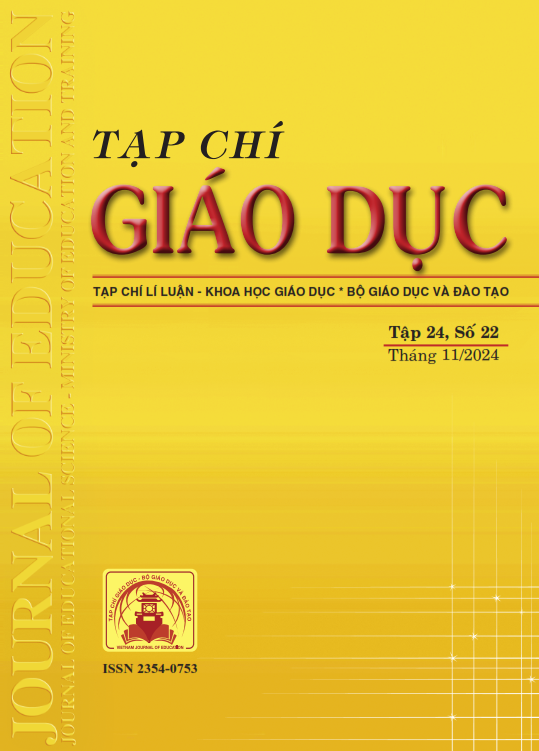Sử dụng Quizalize hỗ trợ đánh giá thường xuyên trong dạy học “Công, năng lượng, công suất” (Vật lí 10)
Tóm tắt
In the current context of education, applying information technology to enhance the quality of education in the teaching and learning process is critical. Online tools like Quizalize possess significant potential in facilitating regular assessments, enabling teachers to effectively and promptly monitor students' learning progress. This study aims to propose a process and evaluate the effectiveness of using Quizalize to support formative assessment in teaching Physics Grade 10, specifically “Work, Energy, and Power”. The proposed process for using Quizalize comprises two stages: designing questions and organizing formative assessment activities. The pedagogical experiment was conducted with 80 tenth-grade students at Pedagogical Practice High School, Dong Nai University, to juxtapose the effectiveness of the experimental group (using Quizalize) with that of the control group (using traditional methods). The results indicate that the group using Quizalize had a higher average score and a higher proportion of students achieving high scores than those using traditional methods. Quizalize has created an interactive learning environment, providing immediate and personalized feedback, promoting student engagement and enhancing learning outcomes.
Tài liệu tham khảo
Ban Chấp hành Trung ương (2013). Nghị quyết số 29-NQ/TW ngày 04/11/2013 về đổi mới căn bản, toàn diện về giáo dục và đào tạo, đáp ứng yêu cầu công nghiệp hóa, hiện đại hóa trong điều kiện kinh tế thị trường định hướng xã hội chủ nghĩa và hội nhập quốc tế.
Bộ GD-ĐT (2018). Chương trình giáo dục phổ thông môn Vật lí (ban hành kèm theo Thông tư số 32/2018/TT-BGDĐT ngày 26/12/2018).
Bộ GD-ĐT (2020a). Thông tư số 26/2020/TT-BGDĐT ngày 26/8/2020 sửa đổi, bổ sung một số điều của Quy chế đánh giá, xếp loại học sinh trung học cơ sở và học sinh trung học phổ thông (ban hành kèm theo Thông tư số 58/2011/TT-BGDĐT ngày 12/12/2011).
Bộ GD-ĐT (2020b). Thông tư số 32/2020/TT-BGDĐT ngày 15/9/2020 ban hành điều lệ trường trung học cơ sở, trường trung học phổ thông và trường phổ thông có nhiều cấp học.
Bộ GD-ĐT (2021). Thông tư số 22/2021/TT-BGDĐT ngày 20/7/2021 ban hành quy định về đánh giá học sinh trung học cơ sở và học sinh trung học phổ thông.
Chou, P. N., Chang, C. C., & Lin, C. H. (2017). BYOD or not: A comparison of two assessment strategies for student learning. Computers in Human Behavior, 74, 63-71.
Nguyễn Công Khanh, Đào Thị Oanh (2016). Giáo trình kiểm tra đánh giá trong giáo dục. NXB Đại học Sư phạm.
Marangunić, N., & Granić, A. (2015). Technology acceptance model: a literature review from 1986 to 2013. Universal Access in the Information Society, 14, 81-95.
Muslimin, A. I., & Ivone, F. M. (2024). Exploring Game-Based Language Learning Applications: A Comparative Review of Quizwhizzer, Oodlu, Quizalize, and Bamboozle. iTELL Journal, 1(1), 20-28.
Onasanya, T. O., Otemuyiwa, B. I., & Onasanya, S. A. (2020). Perception of undergraduates on the utilization of Quizalize app for formative assessment in online educational programme in the University of Ilorin. West African Journal of Open & Flexible Learning, 9, 1-7.
Puustinen, M., & Pulkkinen, L. (2001). Models of self-regulated learning: A review. Scandinavian Journal of Educational Research, 45(3), 269-286.
Wulandari, B. L., & Hartono, M. (2021). The effectiveness of using Quizizz and Quizalize media on mathematics learning outcomes of grade IV students. In 2021 7th International Conference on Education and Technology (ICET) (pp. 320-325). IEEE.
Tải xuống
Đã Xuất bản
Cách trích dẫn
Số
Chuyên mục
Giấy phép

Tác phẩm này được cấp phép theo Ghi nhận tác giả của Creative Commons Giấy phép quốc tế 4.0 .












